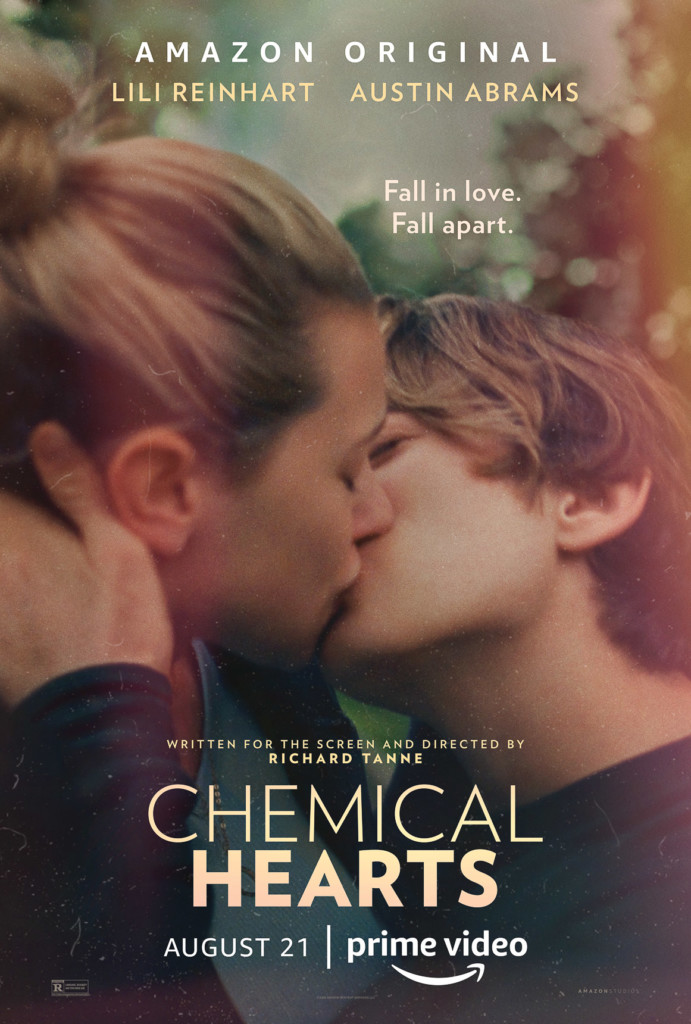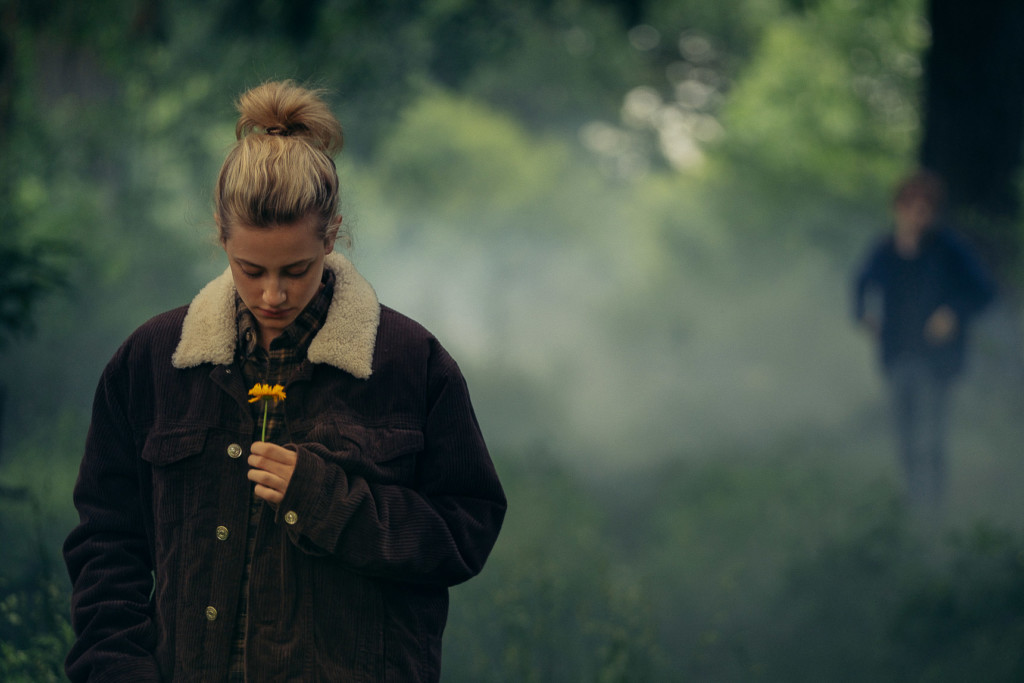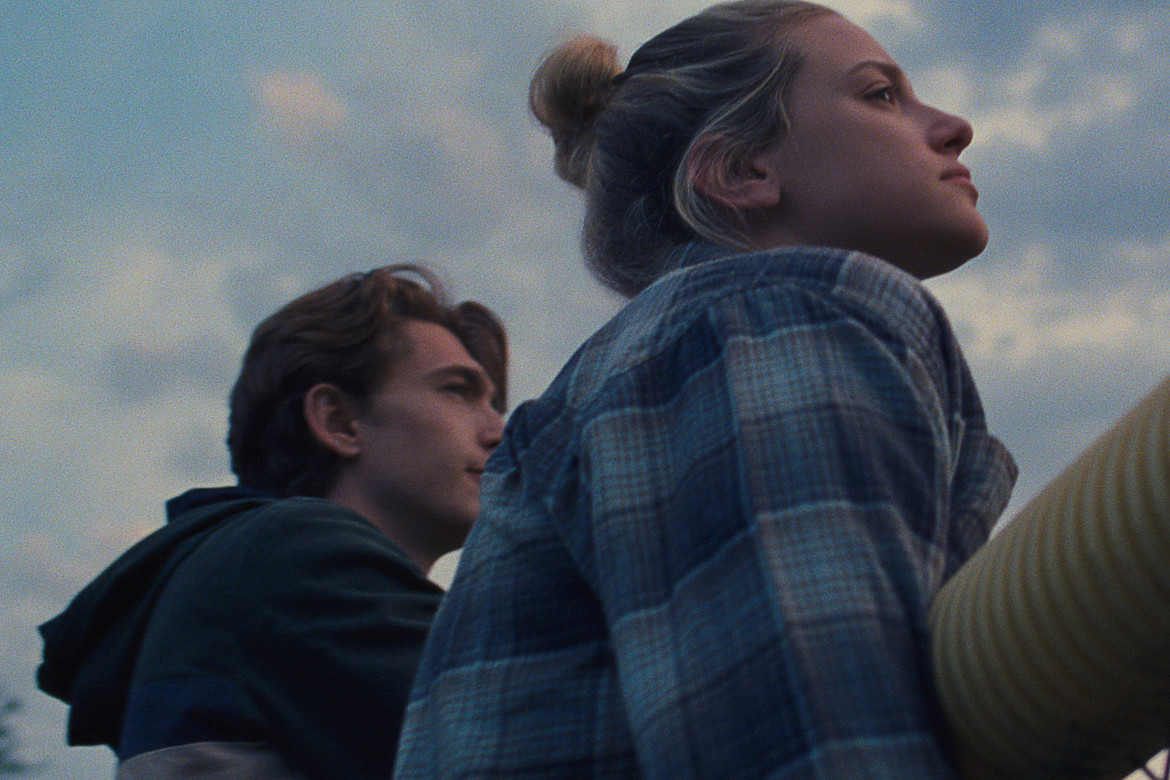By Kirsten Coachman
Our high school years are often full of overwhelming emotional firsts: first love, first heartbreak, first unexpected loss. In writer-director Richard Tanne’s sophomore feature film “Chemical Hearts,” the moment high school senior Henry Page (Austin Abrams) briefly locks eyes with transfer student Grace Town (Lili Reinhart), he realizes that his world is about to be knocked off its axis. From awkward car rides with Beach House wafting through the speakers to sharing moments together, outside of editing the school newspaper, Grace begins to let her guard down with Henry, who can’t help but want to make her feel whole.
The film, based on Krystal Sutherland’s best-selling novel, “Our Chemical Hearts,” examines the complicated, hard-to-explain feelings that arise during our teenage years through the lens of Henry and Grace’s relationship.

Earlier this week, Art U News spoke with Reinhart, Abrams, and Tanne over Zoom to talk all things “Chemical Hearts,” including Reinhart’s decision to become an executive producer on the film, the cast’s natural chemistry on set, and Tanne’s nostalgic decision behind shooting the movie on 35mm film.
Lili Reinhart
Gaining worldwide recognition as Betty Cooper on The CW’s “Riverdale” and 2019’s “Hustlers,” Reinhart flexes more than her acting chops in “Chemical Hearts,” as she adds the role of executive producer to her credits. As she explained during our Q&A, it’s a different kind of role for the actress and showcases her versatility in the film as the seemingly sullen teen who gets around with the use of a cane. Reinhart’s portrayal of grief following an insurmountable loss is nothing short of compelling.
What drew you to want to play Grace Town?
I really loved Grace’s darkness and vulnerability. I hadn’t yet been able to play a character who felt so raw and not put together. I really appreciated the fact that I could play the romantic lead as a woman in something that I wasn’t playing the stereotypical appealing, cute, funny, charming girl. The fact that she’s none of those things and yet attracts Henry is so interesting to me… and beautiful. And I just thought that playing a girl who was going through a grieving period and a period of heartache would be really interesting to play and a challenge for me, as well. And I’m always up for a challenge.
What was it about the book that made you want to take on a bigger role as executive producer and getting the film made?
The book was presented to me and I was asked, “Would you want to executive produce this?” So the opportunity came along very organically, but I wanted to executive produce because I felt that I wanted to make this book into a film, but I wanted the film to be very specific. I wanted it to not be too close to the book. I wanted it to be a little bit darker, a little bit [rawer], and a little bit more adult feeling—to kind of take it out of the young adult genre. I felt like, “Oh, okay, I should be an executive producer on this, because I want to make sure that my vision for this is portrayed.” I didn’t want to hand over a book to a studio and be like, “I want to make this,” and then have them make just kind of another teen film that’s maybe a little campy, a little cheesy. I wanted to do something that felt more grounded.
You have spoken a little bit about your emotional connection with Grace as a character and some of the experiences you went through and you noted that it wasn’t always easy to do—getting into her psyche. Was it more of an advantage or a challenge playing a role where you connect with the character as deeply as you did with Grace?
I think it was definitely an advantage. I think I have felt the grief, maybe not to the extent [Grace does], because the love of her life passed away, but I think we all feel grief when a relationship ends, and I think I could relate to the heartache and grief that she was going through.
I think it’s a challenge in a way to be playing a character that’s so emotional because it requires a lot of digging and kind of bringing up your own experiences into a role. I personally do that. Some actors don’t kind of bring their own experiences in, but I definitely do. And [it’s] challenging in that way, because you have to kind of sift through your own emotions and let yourself go to these deep vulnerable places.
How did you balance the different aspects of your character?
It was challenging because I knew I needed to play someone who was obviously going through such a hard time emotionally, but she also still had to be likable. That was a delicate balance. I remember writing in my script, “don’t be a b—h,” because it’s easy to play someone who’s sad and going through a lot. My automatic assumption is, “Oh, well, people are going to think she’s a b—h because she’s not warm and fuzzy,” but I don’t think she is. I really don’t. It was an active effort to make sure she didn’t come across that way.
I think she’s charming. And you can learn to care about her because you appreciate how vulnerable she is. And obviously how much she was able to love someone else. She’s truly experiencing the loss of someone. And I think nothing’s more beautiful than seeing someone’s pain because you can appreciate the level of love that they must have had for something that they lost.

Being that “Chemical Hearts” is a pretty emotional story, what was your experience like during filming?
Intense, but also in a great way. I truly loved filming this movie and it’s hard because I was playing this character that was so depressed and going through [this] awful emotional turmoil, but I was also having the best time. I was working with such a collaborative director and such an amazing co-star in Austin. And it was just really such a wonderful filming experience that I kind of lost myself. Even though it was emotional, I still somehow managed to have such a great time. And I think that just fully supports how wonderful and collaborative my team helping me make it was.
Could you relate to the idea of being in teenage limbo at that age?
Yeah. I didn’t have an easy time being a teenager. It was not fun for me. I had fallen into a deep depression when I was 16. And I felt like I was entirely in limbo because I was wanting so desperately to be an actress and to pursue this career. I knew what I wanted to do. I had such a passion for it. And on the other hand, I was still stuck in high school or still stuck in this world that I felt really wasn’t understanding of me.
I felt like the people at school around me, my peers didn’t really get it. They didn’t understand me. They just weren’t really on my level, in a way. My ambition was so high and so strong. And, to me, my teenage limbo was very much me feeling quite alone and confused as to whether or not I was following a path that I should be because I had chosen a hard career to get into. I think I had enough faith in myself that I pursued it and it happened.
But yeah, teenage limbo, you’re just trying to figure it out a very confusing time. Luckily, now there’s more resources for people who are more like me and struggling in high school. There [are] more resources, you know, YouTube, TED Talks to watch and books to read and celebrities and advocates to look up to that are speaking out about those things.
Do you have a favorite scene from the film?
People have asked me what the hardest scene was, but…oh god, a favorite? I don’t even know. I think I really enjoy where Henry says that he loves her for the first time where he says, “I’ve known all along that I’ve loved you,” and you can see kind of his desperation for her and his desperation for her to reciprocate. And it’s so hard to watch, but also so beautiful to watch and it feels very real and you’re almost like, oh, I can connect with that desperate part of you and of all of us that wants to be loved possibly by someone who doesn’t love us back.
And I think it’s such a beautiful and such a well-acted scene by Austin. We actually had to film that scene twice actually on two different days, because the first time we filmed it, the camera was completely out of focus the whole time. So, we had to literally film it twice, which sucked, but actually ended up being great because I think it was definitely better the second time. But poor Austin, I was like, damn, this is like, your scene, you’re so emotional, and he had to do it twice. But it’s still my favorite.
